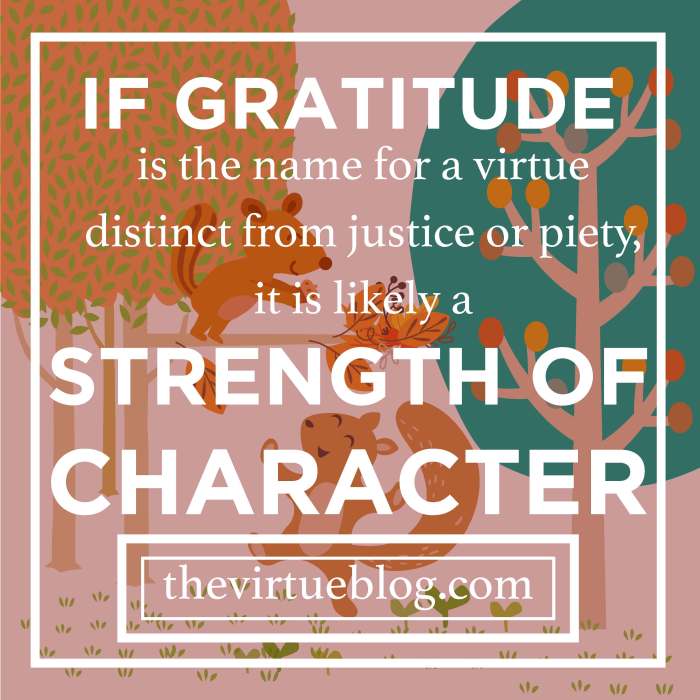Expressions of personal gratitude come in many shapes and sizes. Sometimes an expression of personal gratitude has a specific benefactor as its addressee (as in triadic gratitude). But more often than not, as is the case with any genuine virtue, personal gratitude outstrips the stuff of thank you notes and warm feelings toward benefactors. For example, I may help a child learn to read or to swim in part as an expression of my gratitude to the adult who taught me to do these things. And some material expressions of personal gratitude benefit many other people by helping to support institutions that were crucial to the beneficiaries. A grateful patient in a position to do so might donate buildings or equipment to the hospital where her or his health was restored. Alumni may make donations to their schools, colleges, or universities. In all of these cases, personal gratitude exceeds the strict limits of triadic gratitude because the expression of personal gratitude is more than a kind of thank you note to an individual benefactor.

When I express triadic gratitude, or personal gratitude more generally, I know the people or institutions that helped me on my way, I know the kind of help they gave me, and I have a clear idea of the kind of good I give back in expressing gratitude. I strongly suspect that truly grateful people have a strength of character that exceeds these limits in various dimensions. For example, the struggles of people who died long ago, whose names I do not know, and who never knew me, made possible the horizon of possibility and and the particular opportunities that characterize much of the good available to me. It is safe to assume that those people were in no position to imagine the kind of goods I take for granted. That it is easy for someone like me to take for granted things that most people, even now, cannot take for granted betrays a kind of lack of gratitude for the indefinitely many strangers whose lives and deaths produced or prop up the world I trust and enjoy. If I am alive to this aspect of my world, I may be in a position to experience and express transpersonal gratitude.
In transpersonal gratitude, I seek to carry the good I enjoy forward in a way that will benefit people I will never meet in ways that go beyond what I can imagine. Knowing the centrality of education to the life that I have made, I seek to support educational institutions and policies that will benefit young people long after I am gone by opening possibilities for them that I cannot foresee. Knowing the joy, peace and pleasure I have had by having opportunities to spend time in nature, I support efforts to produce and nurture green spaces in my city, where people I may never meet may benefit in more ways than I know by being able to take a walk under the trees.
Transpersonal gratitude is not opposed to personal gratitude, and neither of these is at odds with triadic gratitude. Actually, if gratitude is the name for a virtue distinct from justice or piety, it is likely a strength of character that opens grateful people to all of these kinds of reasons to be thankful, and all of these ways to think about working to express that thankfulness.
Part I: Candace Vogler on Triatic Gratitude, November 23, 2015.
Part II: Candace Vogler on Personal Gratitude, November 25, 2015.
Candace Vogler is the David B. and Clara E. Stern Professor of Philosophy and Professor in the College at the University of Chicago, and Director and Principal Investigator for Virtue, Happiness, & the Meaning of Life.
